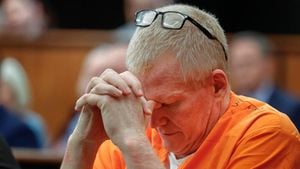The political climate in Mexico has become increasingly dangerous, marked by rising violence against public officials and judges. Just this week, Judge Edmundo Roman Pinzon was shot multiple times outside of a courthouse in Acapulco, Guerrero, highlighting the grim reality facing those who stand on the front lines of the law.
Pinzon, the president of the Superior Court of Justice for Guerrero state, was gunned down as he sat in his car—a chilling reminder of the threats looming over judicial figures and the broader societal anxiety over safety. Acapulco, once famed for its stunning beaches and vibrant nightlife, has seen its reputation tarnished by bloodshed, plunging it to levels where it ranks among the world's most dangerous locales.
The state of Guerrero has witnessed rampant violence this year, heavily tied to organized crime. Just prior to Pinzon's assassination, the mayor of Chilpancingo found his life cut short, brutally decapitated just days after taking office. Such high-profile attacks underline not just the perilous conditions under which public servants operate but also the failure of security protocols intended to protect elected officials and judges alike.
Guerrero’s struggles are emblematic of Mexico’s broader crisis, where over 450,000 murders have occurred since 2006, driven primarily by drug trafficking and turf wars between cartels. President Claudia Sheinbaum, who took office recently as the first female president, has insisted on steering clear of reviving the violent “war on drugs” strategy. Instead, she advocates for addressing the roots of crime through social policies and preventive measures—a vision she claims to be following from her predecessor, Andres Manuel Lopez Obrador.
On the ground, though, violence continues to spiral. Her administration's strategy remains under scrutiny, particularly with statistics showing Guerrero recorded 1,890 murders last year alone. The dire security climate prompted religious leaders earlier this year to broker peace agreements between rival factions of drug cartels. Still, these efforts seem far from stabilizing the current turmoil.
Adding to the disquiet were the earlier unfortunate events this week, including the murder of Benito Aguas, a congressman from the Green Party, shot dead alongside another individual during the latest wave of political killings. This attack rippled fears through local governance, especially with Aguas being part of the ruling coalition aligning with President Sheinbaum.
Though political violence is typically associated with cartel rivalries, this year has shown political actors like mayors, councilwomen, and now judges being targeted as well. Aguas’s murder reflects the climate of fear permeated by organized crime, raising concerns over the government's capacity to protect its officials.
The burgeoning violence against political figures reveals broader questions surrounding the effectiveness of current policies. Following the assassinations, Aguas’ leadership voiced hopes for thorough investigations to deliver justice—a sentiment echoed by President Sheinbaum herself, who vowed to ramp up security measures for politicians amid this violence epidemic.
Yet, with the everyday Mexican citizens witnessing the ramifications of insecurity, there’s skepticism over whether the government's approaches will be sufficient to restore peace. Reports of armed clashes resulting in high casualties abound, making citizens wonder if they are safe even within their own communities.
The violence has not deterred all citizens. Many remain unchained by fear, such as those supporting grassroots movements determined to press political dialogues forward, regardless of safety hazards. The stark reality remains, though—with every high-profile murder, the threat level rises, creating apprehension among the electorate and, paradoxically, reinforcing the very fears the administration seeks to address.
This relentless wave of violence serves as both a symptom and catalyst of Mexico's broader social discontent, where justice seems elusive and personal safety dwindles. Acapulco, once teeming with prosperity and international visitors, now faces challenges of rebuilding its integrity and public trust amid bloodshed.



